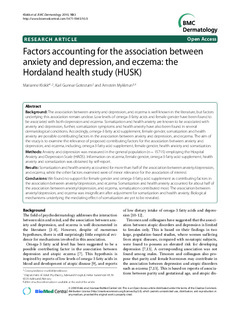| dc.description.abstract | Background: The association between anxiety and depression, and eczema is well known in the literature, but factors
underlying this association remain unclear. Low levels of omega-3 fatty acids and female gender have been found to
be associated with both depression and eczema. Somatization and health anxiety are known to be associated with
anxiety and depression, further, somatization symptoms and health anxiety have also been found in several
dermatological conditions. Accordingly, omega-3 fatty acid supplement, female gender, somatization and health
anxiety are possible contributing factors in the association between anxiety and depression, and eczema. The aim of
the study is to examine the relevance of proposed contributing factors for the association between anxiety and
depression, and eczema, including, omega-3 fatty acid supplement, female gender, health anxiety and somatization.
Methods: Anxiety and depression was measured in the general population (n = 15715) employing the Hospital
Anxiety and Depression Scale (HADS). Information on eczema, female gender, omega-3 fatty acid supplement, health
anxiety and somatization was obtained by self-report.
Results: Somatization and health anxiety accounted for more than half of the association between anxiety/depression,
and eczema, while the other factors examined were of minor relevance for the association of interest.
Conclusions: We found no support for female gender and omega-3 fatty acid supplement as contributing factors in
the association between anxiety/depression, and eczema. Somatization and health anxiety accounted for about half of
the association between anxiety/depression, and eczema, somatization contributed most. The association between
anxiety/depression, and eczema was insignificant after adjustment for somatization and health anxiety. Biological
mechanisms underlying the mediating effect of somatization are yet to be revealed. | nb_NO |
